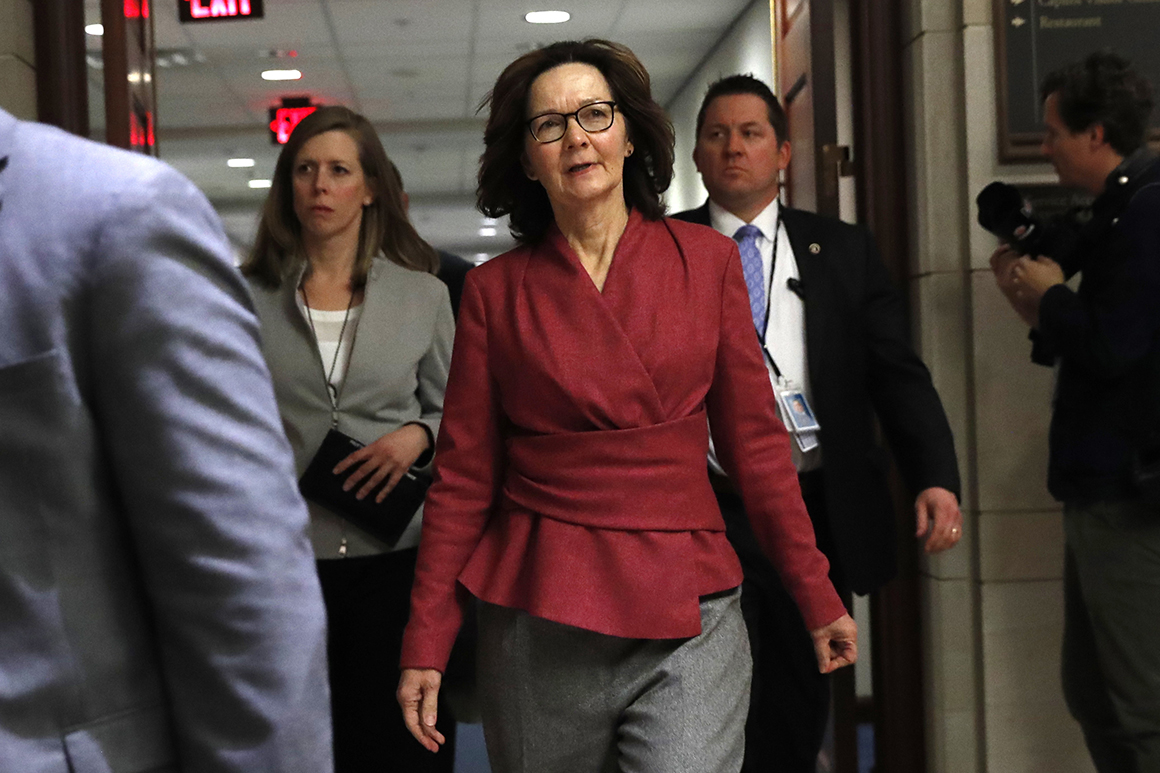
As a career agency official, Haspel is generally held to the same standard as military leaders, who usually clap sparingly, if at all, during the State of the Union to avoid any appearance of partisanship, the former officials said. (Chairman of the Joint Chiefs of Staff Mark Milley did clap on Tuesday night in memory of Kayla Mueller, who was kidnapped by ISIS and killed in 2015.)
It’s definitely uncomfortable to be sitting in the middle of the president’s Cabinet area of the audience, “where enthusiasm would be unbridled,” and be the only one not clapping, noted Larry Pfeiffer, a 32-year intelligence veteran who now serves as the director of the Michael V. Hayden Center for Intelligence, Policy and International Security at George Mason University.
“It may be just human nature—and very awkward to do anything but—clap along,” Pfeiffer said.
But CIA directors haven’t traditionally made it a habit of attending the speech to begin with, former officials said, for just that reason.
“Generally CIA directors have felt awkward at these things and have not gone often,” said former acting CIA director John McLaughlin.
“It’s not my job,” said Hayden, who noted that he “never” attended the address as CIA director.
Neither did John Brennan when serving as CIA director, though he previously was a top official in the Obama White House. “Never once,” said Brennan’s spokesman, Nick Shapiro.
“I can’t remember this being regular practice in recent years,” said George Little, a former CIA public affairs director.
McLaughlin noted, though, that Trump’s inclusion of Haspel as a Cabinet member—which not all CIA directors have been by their respective presidents—complicates things a bit. “When they do go they have usually taken their cue from the Joint Chiefs’ posture,” he said.
Pfeiffer agreed. “Much depends on whether or not the position formally resides in the Cabinet,” he said, noting that George Tenet attended some State of the Union addresses during the Clinton years, “but tried to avoid them if he could.”
Pfeiffer recalled that Tenet was at first unsure how to navigate the president’s invitation, and met with his top lieutenants “to discuss how he should act.”
The optics of Haspel’s standing and clapping at the president’s remarks were particularly jarring, though, given Trump’s notoriously rocky relationship with the intelligence community.
He has repeatedly downplayed intelligence assessments that Russia interfered in the 2016 election, while suggesting that other countries – notably Ukraine – did so instead.
Trump visited the CIA’s headquarters in Langley, Va. the day after his inauguration, launching into an impromptu political speech in which he touched on his crowd sizes, attacked the “dishonest media” and boasted that “probably almost everybody in this room voted for me.”
The president has also compared the spy agencies to Nazis, publicly questioned their competence on assessments of Iran, North Korea and ISIS, and last year put the agencies on a collision course with the Justice Department by giving the attorney general sweeping powers over the nation’s secrets. He also said last summer that “the intelligence agencies have run amok” and needed to be reined in.
Many past CIA directors have come from political backgrounds, including Pompeo and other Hill veterans like Porter Goss, a former Florida congressman who preceded Hayden in the job. Tenet was a Senate staffer who joined Bill Clinton’s National Security Council team, skillfully navigating an ascent that saw him rise to become CIA director under both Clinton and George W. Bush.
And many past agency leaders, notably Brennan and Hayden, have been outspoken critics of Trump – often in strident terms. Michael Morrell endorsed Hillary Clinton in a New York Times op-ed during the 2016 campaign, in which he slammed Trump as “an unwitting agent of the Russian Federation.”
Even Trump’s own appointees have been openly critical of their boss, as when Dan Coats, who was then the director of national intelligence, quipped “that’s gonna be special” when informed onstage at a conference that Russian President Vladimir Putin had been invited for a White House visit.
The mutual hostility has undoubtedly contributed to a climate of mistrust between the president and intelligence community that deepened when a whistleblower’s complaint from inside the CIA rocked his administration and set off an impeachment inquiry.
Haspel, a veteran intelligence officer known for her fierce loyalty to the CIA and acute political antennae, has rarely made headlines during her nearly two-year tenure as CIA director, turning her focus inward on building morale and boosting recruitment. That strategy has kept her out of Trump’s sights, and may also inform Haspel’s willingness to appear overly enthusiastic about the president and his policies in his presence.
But generally speaking, said Pfeiffer, “those who come to the director’s job as career professionals would be held to the same standard to which we hold our military leaders, particularly by their colleagues in the intelligence service.”
A spokesperson for the CIA declined to comment.
Source: politico.com
See more here: news365.stream





